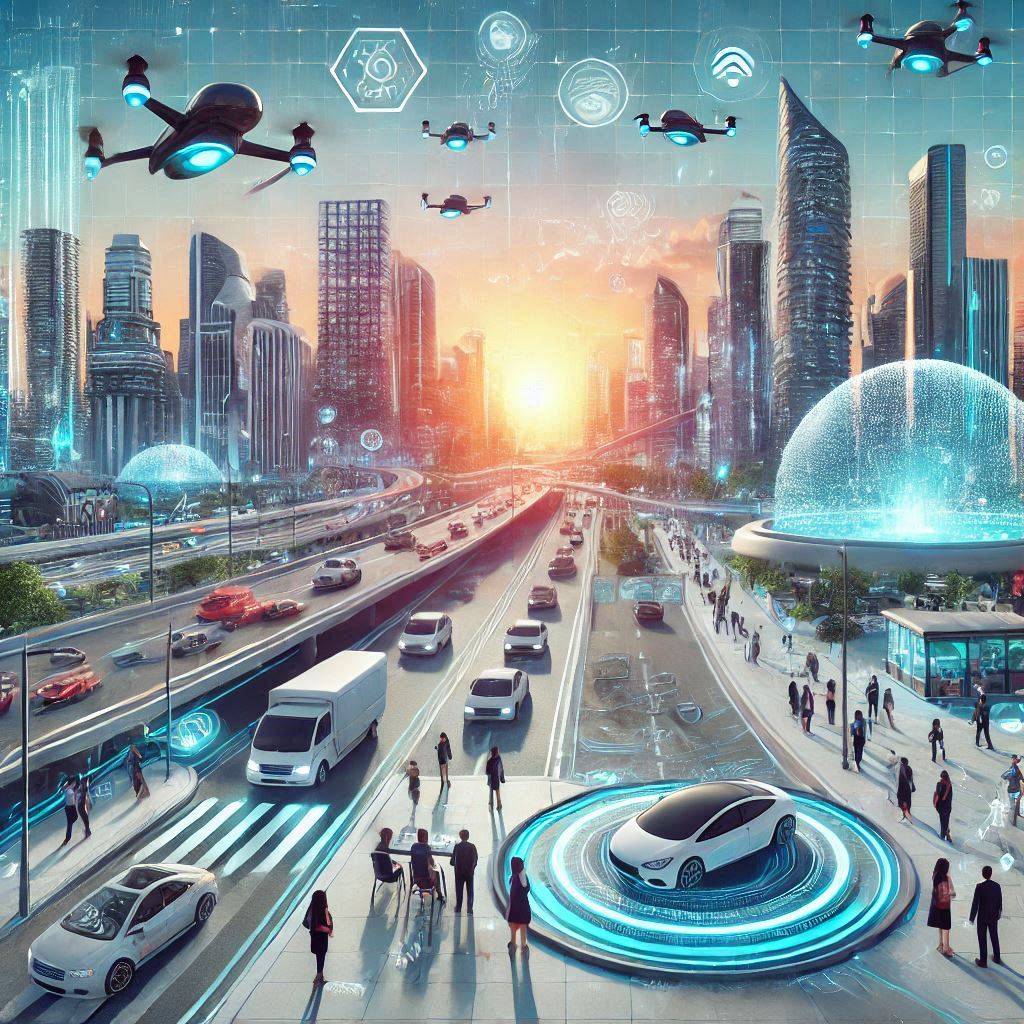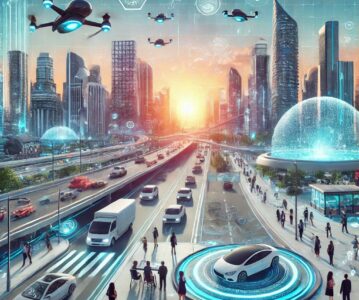As we move closer to 2025, one of the most significant technological revolutions in the software development field is already underway: the rise of AI-driven development. Artificial Intelligence (AI) is not only transforming industries like healthcare, finance, and education but also reshaping the way developers design, build, and maintain software. In this blog post, we will explore the trends, tools, and advancements we can expect to see in AI-driven development by 2025, along with the opportunities and challenges that come with this shift.

The Increasing Role of AI in Software Development
By 2025, AI will likely play a much more integrated role in the software development lifecycle. AI-driven tools will assist with everything from writing and testing code to automating repetitive tasks and predicting software failures. This shift will drastically improve efficiency, reduce human error, and accelerate development timelines.
What to Expect:
- AI-Assisted Code Generation: Tools like GitHub Copilot and OpenAI’s Codex are already making it easier for developers to generate code by simply describing what they want. In 2025, expect these tools to become even more sophisticated, understanding complex requirements and offering tailored solutions in real-time.
- AI-Powered Debugging and Testing: AI will help developers identify bugs more quickly and efficiently. Expect smart tools that automatically find and fix bugs in code or suggest optimizations.
| Feature | Traditional Code Writing | AI-Assisted Code Generation |
|---|---|---|
| Code Generation | Features | AI generates code from text prompts |
| Learning from Context | Limited understanding of project context | AI understands and adapts to project context |
| Speed | Time-consuming and tedious | Faster code completion |
AI-Driven Low-Code and No-Code Platforms
Low-code and no-code platforms, already popular in 2023, will evolve significantly with AI by 2025. These platforms will allow even those with little to no programming experience to create complex applications. With AI’s help, such platforms will automatically generate app logic, integrate with APIs, and handle data flows, dramatically reducing the time and skill required for app development.
What to Expect:
- Automated App Building: In 2025, developers will spend less time writing boilerplate code. AI will help generate application frameworks, including logic, UI, and backend systems, based on simple natural language descriptions.
- Customization and Personalization: AI will be able to understand user requirements and generate unique, customizable solutions tailored to specific business needs. This means the barrier to entry for developing powerful applications will continue to shrink.
| Feature | Traditional App Development | AI-Enhanced Low-Code Platforms |
|---|---|---|
| Development Speed | Slow and requires coding expertise | Fast development with no or minimal coding |
| User Requirements | Must be clear and detailed | AI suggests features based on user input |
| Customization | Requires in-depth knowledge of the system | AI provides automatic customization options |
AI in Code Review and Quality Assurance
Code quality is paramount to building secure and efficient applications. AI tools will become increasingly capable of reviewing code and recommending improvements, ensuring that software is of the highest quality. These tools will evaluate code structure, readability, efficiency, and security, saving developers time and helping avoid critical errors.
What to Expect:
- AI-Driven Static and Dynamic Analysis: Tools that automatically analyze the code for vulnerabilities, inefficiencies, and performance bottlenecks will become more widespread. Expect AI to not only suggest improvements but also fix code on its own.
- Enhanced Continuous Integration (CI) Pipelines: By 2025, CI pipelines will be AI-powered, able to automatically run unit tests, simulate real-world usage scenarios, and ensure that new features do not break existing code. AI will also monitor for inconsistencies across various platforms and environments.
| Testing Process | Manual Testing | AI-Assisted Testing |
|---|---|---|
| Bug Detection | Manual checks | AI identifies bugs in real-time |
| Test Case Generation | Time-consuming and error-prone | AI generates test cases automatically |
| Regression Testing | Manually triggered after every change | AI continuously monitors for regression |
AI in Software Deployment and Operations (DevOps)
AI-driven automation will dominate DevOps workflows by 2025. From automatically scaling cloud infrastructure to predicting system failures, AI will allow for greater operational efficiency and faster, more reliable deployments.
What to Expect:
- Autonomous DevOps: Expect AI to handle most aspects of deployment, such as determining when and how to scale infrastructure based on traffic, applying patches or updates without manual intervention, and predicting potential downtime.
- Predictive Monitoring and Maintenance: AI will predict when and where system failures are likely to occur, allowing teams to take preventive measures before problems impact users. This will drastically reduce system downtime and improve application reliability.
| DevOps Task | Traditional DevOps | AI-Powered DevOps |
|---|---|---|
| Deployment Automation | Manual or scripted deployment | AI automates deployment based on predefined conditions |
| Failure Prediction | Reactive response to failures | AI predicts and prevents failures by analyzing patterns |
| Infrastructure Scaling | Manually adjusting resources | AI automatically scales infrastructure based on usage patterns |
AI for Enhancing Software Security
Security concerns will continue to rise, and AI will play a critical role in building more secure applications. By 2025, we can expect AI systems capable of detecting new threats, identifying vulnerabilities, and responding to security breaches in real-time.
What to Expect:
- AI-Powered Threat Detection: AI will analyze vast amounts of data from multiple sources to identify and predict new forms of attacks (e.g., zero-day exploits). These tools will continuously adapt to emerging threats, offering enhanced security for applications and platforms.
- Automated Penetration Testing: AI will conduct penetration testing by simulating various attack scenarios, finding security loopholes, and fixing them before malicious actors can exploit them.
Natural Language Processing (NLP) in Code Development
Natural Language Processing (NLP) will play a key role in bridging the gap between human intentions and computer programming languages. As AI becomes more adept at understanding and generating human language, developers will be able to use voice commands or written prompts to create complex code.
What to Expect:
- Conversational Programming: Imagine telling an AI system, “Create a login page with email and password fields, validate the input, and send the data to the database.” In 2025, such tasks will likely be carried out seamlessly by advanced NLP models that understand the developer’s request in natural language and convert it into functional code.
- Automated Documentation: AI will assist developers by generating project documentation automatically, based on the code and comments written. This could include API documentation, code explanations, and usage guides.
| Security Process | Traditional Security | AI-Driven Security |
|---|---|---|
| Vulnerability Detection | Manual audits and testing | AI identifies vulnerabilities in real-time |
| Threat Detection | Reactively handled after breaches | AI proactively detects and mitigates threats |
| Penetration Testing | Requires manual involvement | AI automatically conducts penetration testing |
AI-Powered Customizable Development Environments
Integrated Development Environments (IDEs) will be supercharged with AI by 2025. These smart IDEs will learn from the developer’s preferences and writing style to provide real-time suggestions, automate routine tasks, and even predict future coding requirements.
What to Expect:
- Personalized Code Assistance: AI-driven IDEs will offer suggestions based on the specific project context. These tools will analyze the developer’s previous work, suggest relevant libraries or functions, and even refactor code.
- Context-Aware Coding: Advanced AI will understand the context of the code being written and provide error-checking and code-completion in a more intuitive, precise manner, reducing the chances of bugs and improving overall productivity.
Challenges and Ethical Considerations
While the future of AI-driven development holds immense promise, it also raises significant challenges and ethical questions that must be addressed by 2025.
What to Expect:
- Bias and Fairness: As AI systems learn from data, they may unintentionally inherit biases from the datasets they were trained on. Developers will need to ensure that AI-driven systems are designed to avoid reinforcing harmful stereotypes or biases.
- Job Displacement: The widespread adoption of AI in development tools may lead to job displacement in the software industry. However, experts argue that AI will also create new roles for developers who are skilled in working with AI technologies.
- Security and Privacy Concerns: As AI takes on more decision-making roles, ensuring that sensitive data is protected and that AI systems are secure from exploitation will be critical. Developers will need to focus on building secure AI systems that adhere to privacy standards and regulations.
Comparison
| AI-Driven Development | Traditional Development |
|---|---|
| Real-time code suggestions | Manual coding and debugging |
| Automated test case generation | Manual test creation and execution |
| AI-driven deployment automation | Manual or scripted deployment |
| AI-powered security analysis | Static security checks |
| Accelerated application development | Slower and more error-prone |
Summary: Embracing the Future of AI-Driven Development
By 2025, AI will have fundamentally reshaped software development, offering faster, more efficient, and more reliable ways of building applications. Developers will increasingly rely on AI-driven tools for everything from code generation and debugging to security and deployment. However, while the benefits of AI-driven development are clear, it is equally important to address the ethical, security, and employment challenges that come with these advancements.
As we approach 2025, embracing AI as a partner rather than a replacement will be key to unlocking its full potential and driving innovation in the software development industry. Those who adapt to this rapidly evolving landscape will not only gain a competitive edge but also contribute to creating a more efficient and secure digital future.
Discover more from lounge coder
Subscribe to get the latest posts sent to your email.


